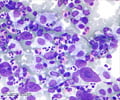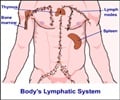Abnormal changes in the epigenetic mixing board can change the expression of genes in cancer, a University of Colorado Cancer Center study has revealed.

The epigenome's primary tool – and by far the easiest to study – is methylation: it attaches little methyl groups to DNA sequences near the genes to silence or promote their expression.
"Not only do we see more abnormal methylation in non-Hodgkin lymphoma patients than in healthy B-cell populations, but there are three distinct subtypes of the disease in the clinic, each more aggressive than the next. These three clinical trajectories of non-Hodgkins lymphoma were distinctly marked by their levels of abnormal methylation," says Subhajyoti De, PhD, CU Cancer Center investigator and assistant professor at the CU School of Medicine.
In other words, methylation patterns predict patient survival. Here's how it works:
DNA should be methylated in a consistent way – you get a certain, standardized amount of methyl "residue" attached to your genes. Sure enough, that's the case in healthy B-cells. Subhajyoti and colleagues show that in cancerous B-cells, the level of DNA methylation from cell to cell varies wildly. And the more wildly the level of DNA methylation varies, the more aggressive is the cancer. It's as if, in the body, you want a consistent epigenome that maintains the methylation of the healthy status quo –when a willy-nilly epigenome drops methylation randomly here and there, it promotes non-normal cells, like cancer.
So abnormal methylation is certainly correlated with not only cancer, but with the aggressive behaviors of cancer subtypes. But what exactly is the functional role of this methylation?
Advertisement
There are drugs that affect the epigenome's ability to methylate and so control genes – some of which crescendo or decrescendo the amount of methylation across the board, and some of which affect the amount of methylation on certain genetic products. Does one of these drugs hold the key to muting cancer?
Advertisement
"For the last 50 years, the scientific community pushed to identify the genetic drivers of cancer, but now in the past five or six years we've expanded the search into the epigenome as well," Subhajyoti says. "We now expect to find that both genetic and epigenetic abnormalities are important for initiation and maintenance of cancer."
Source-Eurekalert










